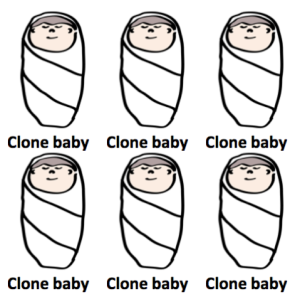Human cloning is not so far-fetched any more.
Cloning of the Star Wars variety where new copies of people (although they would be babies, not adults of course at first) are produced is something I believe that we'll see in the next 1-2 decades.
Why would anyone bother to clone?

Fame. Money. Vanity. There are many reasons, all bad in my opinion.
Then there is the possibility that human cloning could produce babies for infertile couples.
Should human cloning be allowed in the future for making babies for infertile couples?
My answer is "no" and many others including the scientist (Dr. Shoukhrat Mitalipov) whose lab did the astonishing work that first successfully led to human therapeutic cloning (stem cell making, not baby making) and Nobel Laureate John Gurdon agree with me that this would be a big mistake.
But others seem less concerned and strangely maybe even a little enthusiastic about human reproductive cloning.
Take the case of The Center for Human Reproduction (CHR), a fertility center in New York.
This center offers a number of "treatments and specialties" listed on its website that including some that are ethically complicated such as gender selection.
CHR also recently did a piece about the fact that Shoukhrat Mitalipov was a very recent "Grandrounds" speaker at CHR.
The CHR piece talks about how the Mitalipov lab made human ES cells by therapeutic cloning, but then goes on to describe another possible application of the technology in the form of reproductive cloning:
In a more controversial clinical application, this research, however, also potentially points towards the possibility of creating human embryos for infertility treatments in this way. While current U.S. law prohibits human cloning for reproductive purposes, laws, can, of course, change over time, should the safety of this cloning process be established.
Keep in mind this is a fertility center saying this, an organization that profits from creating babies for infertile couples.
To me this sure sounds like an indication that infertility clinics of this kind are at least somewhat interested in the notion of cloning human babies in the future to treat infertility and make money.
Note that to my knowledge their statement that federal law prohibits human cloning is completely incorrect. So no law needs to change to allow cloning. What may happen instead is a greater cultural acceptance of human cloning, which would be very troubling.
Keep in mind that there are two kinds of cloning (therapeutic and reproductive: for more on the difference and a nifty graphic showing parallels and differences, see here).
I think it is realistic to be concerned that human reproductive cloning is indeed on its way in the next decade or so and we just are not ready for that as a society in terms of legal, medical, regulatory, and ethical frameworks. For more on human cloning, the role of stem cells, and a frank look at where the stem cell field stands today, check out my new book "Stem Cells: An Insider's Guide" available for pre-order now here. Note a price change during production means the book will only cost $29.
A version of this piece first appeared on my stem cell blog.